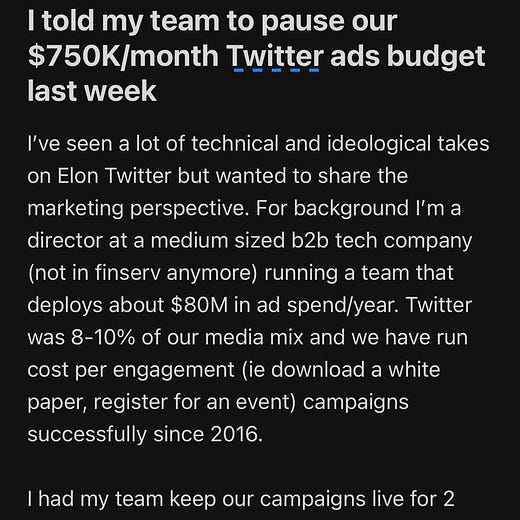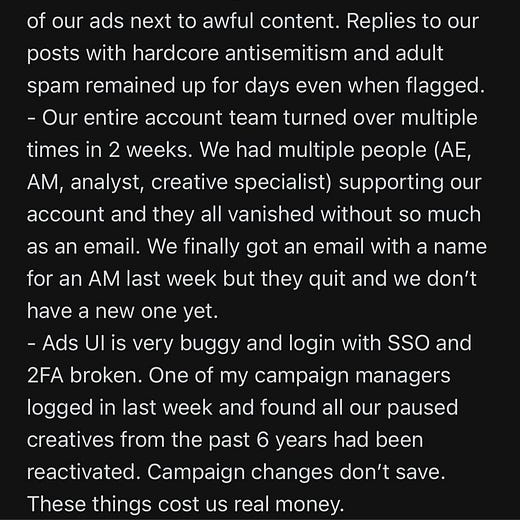👍 The New Internet
Whats the difference between web3 and web 3.0? | advertisers consciously uncouple from Twitter | Meta’s new ‘diplomacy’ AI
Hello, welcome to the newsletter equivalent of a nutrient-rich meal replacement. Your frontal lobe can thank me later. Last week there was no Horrific/Terrific— if you noticed, thank you. If you didn’t… I still like you, it’s okay. Writing a newsletter every week is EXHAUSTING.
This week was good! Finally 👍. Well, actually… was it good? Let’s see
What is the new internet and why do we need one??
Even advertisers, the most aggressively toxic capitalists, find Twitter to be far too hostile to work in
What is ‘Cicero’ and how might it destabalise global diplomatic relations?
📡 The new internet
One of the main things that has contributed to my forever-headache over the last 2-3 years is the purported imminence of a ‘new internet’. Even Tim Berners-Lee, who is dissatisfied with how the internet has evolved over the past couple of decades, thinks we need a new one. He wants us to understand how much he dislikes web3 (which is one of these ‘new internets’), and how it is absolutely nothing like his new thing, which is called web 3.0.
Tim wants us to know that ‘web3’ is a term that was coined after his one (web 3.0), and that they are often conflated, even though they are nothing alike. In case you’re confused, here is a diagram to help you understand the difference between the two:
So hopefully the differences are clear: web3 is the one that is shoved onto our newsfeeds repeatedly by tech bros who are trying to scam us, and Web 3.0 is something that might actually be useful, even though in the diagram above, I am clearly making fun of it.
🤓 Key Web 3.0 attributes:
This version of the web would use a protocol like Solid, which allows people to store their data in their own ‘Pods’
You have full control over your Pod: you decide what goes in it, which entities have permission to access it, etc.
You can store any data in a Pod, and it can be plugged in to any application (so, it’s interoperable)
This kind of ecosystem theoretically enables a global ‘single sign-on’ — so you only need one username for everything, and it’s perfectly secure because you are the only one who controls the data flowing in and out of your Pod, or whatever.
Controversial take: let’s all just fucking relax and stop putting numbers after the word ‘web’. I don’t know what’s happened to western society, but we have an unhealthy preoccupation with stuffing things that don’t matter into unhinged categories. Systematically listing the differences between web1, web2, and WebWhatever wastes your time in the same way that drawing lines between ‘gen z’ and ‘millennial’ does. Just get over it.
The thing we refer to as ‘web2’ felt like an organic shift to the vast majority of internet users, because it was beyond their control. It of course was very on purpose; the web presented whole new ways to monetise and make easy profit. It happens all the time. Behind every cool, new phenomenon is a free-market capitalist waiting to ruin it for everyone else. So I get why Tim is upset but I don’t think his proposed solution (’web 3.0’) is going to work.
What we’re seeing right now, especially with the rough and slow degradation of our dear Twitter, is everyone on all sides trying desperately hard to grapple on to the next big thing. Well… stop it. There needn’t be a central hole that you yell all your thoughts into and pray for an echo. Just use Discord or Mastodon or Cohost or a mixture of everything — you will always be able to find your people. What we have right now is an opportunity to maybe move away from platform behemoths and just communicate with each other via a salad of much smaller services.
You cannot force-feed the masses ‘a new internet’. What Tim Berners-Lee doesn’t seem to understand about his Web 3.0 idea is that it is exceptionally hard to get anyone to change their online behaviours. The sheer irony of telling everyone that they can ‘own their data’ is actually astonishing to me — it promises freedom from the tight grasp of large platforms, which have forced us to be incredibly individualistic, with their narrow mechanics of filling out profiles, maintaining personal brands, and reading feeds tailored especially for each of us (all in the name of ad revenue, of course).
But the idea you can ‘own your data’ is just another flavour of individualism. What data is ‘yours’?? What does it mean to ‘own’ it? Do you own it like you own a car, or do you just have control over it like you do with children (if you subscribe to an authoritarian parenting regime)? Furthermore, data is useful and should be shared. I know that our trust has been betrayed because of years and years of data mining, but that doesn’t mean we should fall backwards into the kind of ‘privacy’ where all you do is keep everything locked away in your own little box.
And finally: the concepts ‘web2’ and ‘web1’ emerged into the mainstream pretty much at the same time ‘web3’ did — because web3 advocates needed to make their collection of shoddy technology and play-to-earn scams sound more important than they actually were. So, they told us that they were building the next iteration of the internet. Let me ask you all something: when what we refer to now as ‘web2’ slowly crystallised onto our devices, was there a group of powerful voices repeatedly telling us, ‘brace yourselves, web2 is coming’? I feel like, no? Are there any white men out there who want to correct me? I’m literally asking you to this time…
🍰 Other stuff to send you off into your weekend feeling superior
Some people are (quite understandably) assuming that advertisers are pulling the plug on their Twitter budget in the name of virtue-signalling. Everything I’ve read suggests the opposite. It’s all about the bottom-line. See this tweet:
And finally, we have Meta with their new AI, Cicero — essentially a chat bot that can best humans at the age-old art of deception. Just what we need!
That’s it for now, I hope someone gives you head this weekend x






